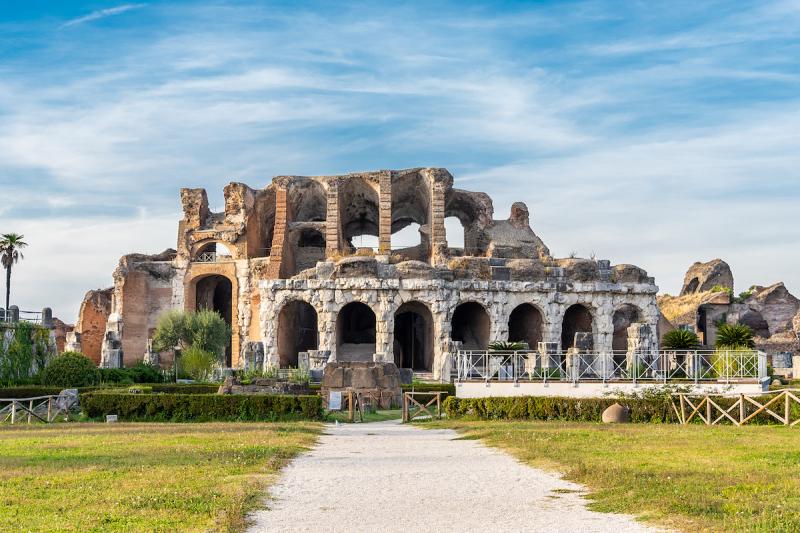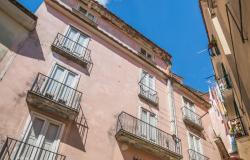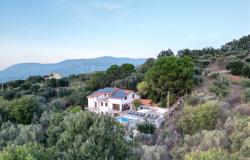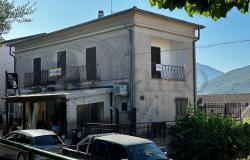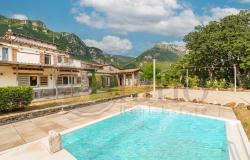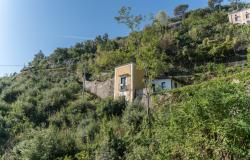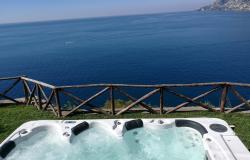Everybody knows Pompeii, and yes, if you’re in the southern Italian region of Campania, it would be hard not to go see it, but be aware that Campania has many other archeological sites that are equally interesting and less crowded. Keep reading.
Herculaneum

Most people flock to Pompeii and ignore its sister site, nearby Herculaneum. Like Pompeii, this ancient Roman town was destroyed and buried by the eruption of Mount Vesuvius in 79 AD; but because it was covered by different volcanic materials, it is better preserved than Pompeii - and just as fascinating, if not more.
The buried remains of Herculaneum were rediscovered in the 1700s, before Pompeii; the excavations however were so difficult that they were repeatedly interrupted in favor of the easier excavation of Pompeii. Indeed, the excavated area of Herculaneum consists of only one quarter of the entire ancient town; the rest of the site still lies beneath modern Ercolano.
Some buildings and decorations are so well preserved that you can easily picture what the city looked like back when it was a wealthy Roman town. Within the site, you can still admire a theater, a basilica and houses richly decorated with mosaics. One of Herculaneum’s most famous villas is the Villa dei Papiri, named for its vast collection of Greek books, now housed in the National Library of Naples.
Anfiteatro Campano, Santa Maria Capua Vetere

Unjustly little-known is the magnificent Roman amphitheater of Santa Maria Capua Vetere, which stands on the ruins of ancient Capua, a town that, under Roman rule, was so wealthy and beautiful that Cicero referred to it as “Altera Roma,” the other Rome.
Santa Maria Capua Vetere’s landmark monument is the Roman amphitheater, the largest in Italy after the Colosseum, for which it probably served as a model; it is often referred to as the ‘Second Colosseum.’
After the fall of the Western Roman Empire, the amphitheater was heavily damaged by the Vandals and in later centuries widely looted. Therefore, little remains of the exterior, while the interior areas, especially the underground tunnels, galleries and vaults, which are intact, give a fascinating insight into how the actors, gladiators and animals were housed, and how they accessed the upper structure.
Overall, the ‘Anfiteatro Campano’ offers an interesting look at the functioning of an ancient Roman amphitheater.
Anfiteatro Flavio di Pozzuoli

The third largest Roman amphitheater in Campania, after the Colosseum and the Amphitheater of Capua, is the Flavian Amphitheater of Pozzuoli, which is part of the Metropolitan City of Naples.
Likely built by the same architects who previously constructed the Roman Colosseum (hence the name Flavian Amphitheater), in the 1st century AD, the Anfiteatro Flavio has the best preserved undergrounds among Roman amphitheaters, and is almost intact inside. The most fascinating part of the visit is seeing parts of gears that were used to lift animal cages up to the arena floor.
Used primarily for gladiatorial combats, the amphitheater could hold up to 40,000 spectators.
Velia, Cilento

In the heart of the Cilento National Park is the archeological site of Velia/Elea.
Velia was the Roman name of an ancient city of Magna Grecia (Elea), located on the coast of the Tyrrhenian Sea. It was one of the main cities of Magna Grecia, together with the more famous Paestum.
Today, you can visit the excavations of the ancient city, which include the city gates (Porta Rosa and Porta Marina), the thermal baths, the acropolis, the agora, a sanctuary, the port area, the Southern Quarter and the Archaic Quarter.
Visitors can take a self-guided tour, or inquire about the various guided tours organized on site.
Paestum (Salerno)

One of the most beautiful archaeological sites in Campania is Paestum.
Established by Greek colonists on the Ionian coast of Calabria in 600 BC, Paestum was originally named Poseidonia, to honor Poseidon, the Greek God of the seas. The Greeks were looking for a new port on the Thyrrenian Sea to expand their trading power, while erecting buildings that have few equals in the world. Indeed, Paestum, thanks to its three ancient Greek temples, some of the best preserved in the world, has been included by Unesco in its World Heritage list.
The most ancient temple dates back to 550 BC and is dedicated to Hera, the goddess of fertility and life; on the opposite side of town is the temple of Athena; the largest of the three is the temple dedicated to Poseidon, which is 60 meters long, 24 meters large and 18 meters high, the equivalent of a six-story building.
The archaeological site of Paestum covers a large area and takes up to two hours to visit. The unique atmosphere created by the ancient ruins can be better appreciated than in an overcrowded site like Pompeii.
